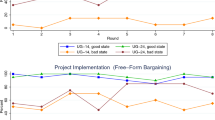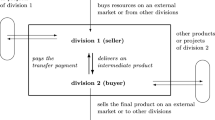Abstract
We study bilateral bargaining problems with an interested third party, the stakeholder, that enjoys benefits upon a bilateral agreement. To address the strategic implications of stakeholders over negotiations, we consider a model where two bargainers interact in the presence of a third party that (a) can transfer a share of her benefits to the bargainers but cannot receive a share of the bilateral surplus, and (b) while she may not participate in all periods of the negotiation, she cannot remain entirely inhibited. Our main findings are:(1) the stakeholder’s (reverse) liquidity constraint implies the existence of a multiplicity of stationary subgame perfect equilibria that include outcomes with very asymmetric bilateral agreements, and (2) the partial participation of the stakeholder may be the source of severe inefficiency
Similar content being viewed by others
References
Bloch F (1996) Sequential formation of coalitions in games with externalities and fixed payoff division. Games Econ Behav 14:90–123
Cornet MF (2003) Partition function bargaining with public demands. Econ Theory 22:845–862
Compte O, Jehiel P (1995) On the role of arbitration in negotiations. mimeo
Gomes A (2003) Multilateral contracting with externalities. Econometrica 73:1329–1350
Gomes A (2003) Valuations and dynamics of negotiations. mimeo
Jarque X, Ponsati C, Sákovics J (2003) Mediation: incomplete information bargaining with filtered communication. J Math Econ 39:803–830
Jehiel P, Moldovanu B (1995) Cyclical delay in bargaining with externalities. Rev Econ Stud 62:619–637
Manzini P, Mariotti M (2001) Perfect equilibria in a model of bargaining with arbitration. Games Econ Behav 37:170–195
Manzini P, Ponsati C (2005) Stakeholders in bilateral conflict. Math Soc Sci 50:166–180
Merlo A, Wilson C (1995) A stochastic model of sequential bargaining with complete information. Econometrica 63:371–399
Montero M (1999) Coalition formation in games with externalities. CentER Discussion paper 99121
Muthoo A (1999) Bargaining theory with applications. Cambridge CUP
Osborne MJ, Rubinstein A (1990) Bargaining and markets. Academic press, New york
Ponsati C (2004) Economic diplomacy. J Public Econ Theory 6:675–691
Rubinstein A (1982) Perfect equilibrium in a bargaining model. Econometrica 50:97–109
Sabourian H, Chatterjee K (2000) Complexity and multiperson bargaining. Econometrica 68:1491–1510
Author information
Authors and Affiliations
Corresponding author
Rights and permissions
About this article
Cite this article
Manzini, P., Ponsati, C. Stakeholder bargaining games. Int J Game Theory 34, 67–77 (2006). https://doi.org/10.1007/s00182-005-0006-1
Published:
Issue Date:
DOI: https://doi.org/10.1007/s00182-005-0006-1




